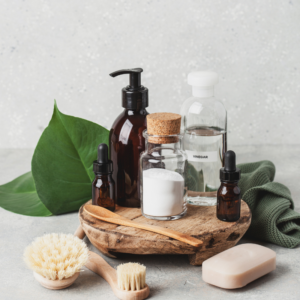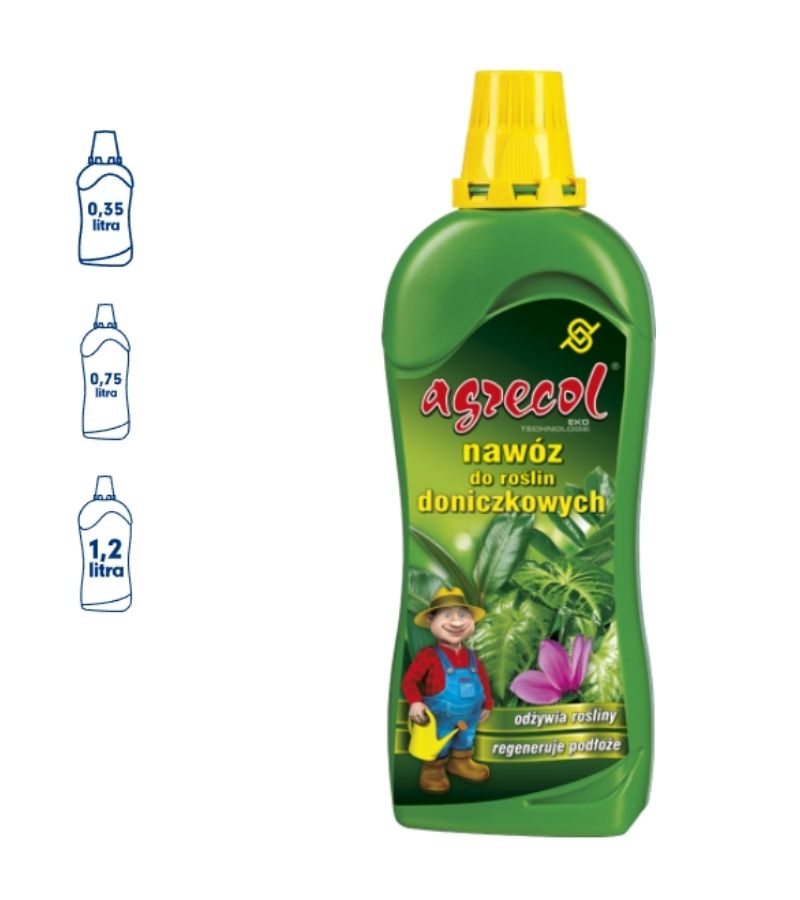Description
ORGANIC – MINERAL FERTILIZER FOR POTTED PLANTS
This product is a liquid organic – mineral fertilizer for potted plants. Designed for year-round fertilization of plants in the cultivation of all potted plants, growing at home.
Recommended for fertilizing both ornamental and flowering plants, e.g. zamiokulkas, diphenbachia, ivy, palm, ficus, begonia, kalanchoe, African violets, amaryllis, anthurium, Persian cyclamen and many other potted plants. If you do not want to use several fertilizers dedicated to different groups of plants, it is worth choosing fertilizers for potted plants with universal use.
- for year-round fertilization of indoor plants
- replenishes nitrogen, phosphorus and potassium deficiencies
- thanks to the combination of mineral and organic ingredients, fertilization is more effective
- It contains biologically active humic substances that support fertilization
- the product works quickly due to the content of minerals
- the fertilizer is effective and safe for the environment
Contents
- nitrogen (N) – 1.5%
- phosphorus (P2O5) – 0.5%
- potassium (K2O) – 1%
as well as extracts of humus compounds supporting fertilization.
All ingredients are water soluble.
Plants grown in pots live in a small soil space, limited by a pot. Therefore, houseplants are particularly vulnerable to the loss of many nutrients. During regular watering, some of the ingredients are washed out. However, most of the minerals are quickly absorbed by plants from the substrate for the proper growth and development of the plant.
Therefore, it is very important to systematically replenish the nutrients in the substrate, which remains unchanged throughout most of the plant vegetation. Fertilizers for potted plants have a balanced composition that ensures high plant health, lush growth and intensive flowering. Plant fertilizers used systematically replenish nitrogen, phosphorus and potassium deficiencies. Fertilization with this fertilizer is completely safe for plants – there is no risk of over-fertilization.
The content of humus compounds in the fertilizer for potted plants regenerates the substrate. Remember that plants develop poorly, do not grow, or even bloom when lacking nutrients. In the event of extreme nutritional deficiencies, the leaves reveal chlorosis (yellowing of the leaves due to the lack of a green pigment – chlorophyll) and other discoloration of the tissues.
Leaves can lose turgor (hydration) and even dry out. A malnourished plant is more likely to contract diseases because it is susceptible to pathogens. Pests can also wreak much more havoc on inadequately nourished plants. The first line of defense against diseases and pests is proper care of potted plants and ensuring optimal conditions for development. Therefore, proper fertilization is essential.
Application method
Preparation of the solution:
The fertilizer cap also serves as a measuring cup for dosing the fertilizer. We dilute with water 35 ml (1 cap) of fertilizer in 1 liter of water.
We use fertilizer while watering. The plants are watered with the amount of the solution as in the routine watering so that the substrate is sufficiently moist. In the period from March to October, the plants should be fertilized every 2-3 weeks.
Fertilize the plants once a month from November to February. Fertilizer for potted plants can be used throughout the season, in the winter season we only reduce the frequency of fertilizer application. Do not exceed the doses of fertilizer specified on the packaging.
Do not fertilize transplanted plants or freshly planted seedlings. Let us give them time to adapt to the new soil environment. Additionally, note whether the planting substrate contains nutrients for the plants. Then we should wait about a month with fertilization. First, the plants will benefit from the ingredients contained in the substrate.
Package: 0.35 L
If you’re unsure about this product, then feel free to contact our team. We’ll be glad to assist you, explain how the product works, also recommend other suitable options for you. You can also contact with us on our fan page on Facebook – Garden Centre Margaret Mayar.
NAWÓZ ORGANICZNO-MINERALNY DLA ROŚLIN DONICZKOWYCH
– do całorocznego nawożenia roślin pokojowych
– uzupełnia niedobory azotu, fosforu i potasu
– dzięki połączeniu składników mineralnych i organicznych nawożenie jest skuteczniejsze
– Zawiera biologicznie aktywne substancje humusowe wspomagające zapłodnienie
– produkt działa szybko dzięki zawartości minerałów
– nawóz jest skuteczny i bezpieczny dla środowiska
Zawartość
azot (N) – 1,5%
fosfor (P2O5) – 0,5%
potas (K2O) – 1%
a także ekstrakty związków humusowych wspomagających zapłodnienie.
Wszystkie składniki są rozpuszczalne w wodzie.
Fertilizer for potted plants is a liquid organic-mineral fertilizer. Designed for year-round fertilization of plants in the cultivation of all potted plants, growing at home. Recommended for fertilizing both ornamental and flowering plants, e.g. zamiokulkas, diphenbachia, ivy, palm, ficus, begonia, kalanchoe, African violets, amaryllis, anthurium, Persian cyclamen and many other potted plants. If you do not want to use several fertilizers dedicated to different groups of plants, it is worth choosing fertilizers for potted plants with universal use.
Plants grown in pots live in a small soil space, limited by a pot. Therefore, houseplants are particularly vulnerable to the loss of many nutrients. During regular watering, some of the ingredients are washed out. However, most of the minerals are quickly absorbed by plants from the substrate for the proper growth and development of the plant. Therefore, it is very important to systematically replenish the nutrients in the substrate, which remains unchanged throughout most of the plant vegetation. Fertilizers for potted plants have a balanced composition that ensures high plant health, lush growth and intensive flowering. Plant fertilizers used systematically replenish nitrogen, phosphorus and potassium deficiencies. Fertilization with this fertilizer is completely safe for plants – there is no risk of over-fertilization. The content of humus compounds in the fertilizer for potted plants regenerates the substrate. It should be remembered that in the absence of nutrients, plants develop poorly, do not grow or even bloom. In the event of extreme nutritional deficiencies, the leaves reveal chlorosis (yellowing of the leaves due to the lack of a green pigment – chlorophyll) and other discoloration of the tissues. Leaves can lose turgor (hydration) and even dry out. A malnourished plant is more likely to contract diseases because it is susceptible to pathogens. Pests can also wreak much more havoc on inadequately nourished plants. The first line of defense against diseases and pests is proper care of potted plants and ensuring optimal conditions for development. Therefore, proper fertilization is essential.
Organo-mineral connection. How it’s working? Why is it so important?
Organic and mineral fertilization, thanks to the combination of two fertilization methods (organic and mineral), has a multidirectional effect. The organic part of the pot plant fertilizer consists of active natural humus. Thanks to humic substances, the biological life of the soil is supported. Useful soil microorganisms affect a number of changes taking place in the soil and have an active effect on the regeneration of the substrate. It is thanks to microorganisms that complex chemical compounds, which in their form are not absorbed by plants, are broken down into components in forms easily absorbed by plants. The organic components of the pot plant fertilizer are released in a long-term and gradual manner.
On the other hand, minerals have a form that is easily and quickly absorbed by plants. They are the first to be used by plants. Thanks to the additional enrichment of minerals, the fertilizer for potted plants works immediately, but not violently. You should never overdo it with mineral fertilization because it can lead to the salinity of the substrate, which will result in the plant dying. However, mineral fertilization in plant nutrition should not be ruled out at all. Many people have great concerns about the use of mineral fertilizers because of the possibility of overloading plants. However, when we use only organic fertilizers all the time, the soil will always lack the necessary amount of Complex elements for digestible forms. With organic and mineral fertilizers, there is no risk and the plants get everything they need. The fertilizer can be used all year round, with the difference that in the winter season the frequency of fertilization is reduced.
The combination of both formulas of fertilization makes the nutrition of plants comprehensive. In addition, the organic compounds that are decomposed in time make the fertilizer longer-acting.
Application method
Preparation of the solution:
The fertilizer cap also serves as a measuring cup for dosing the fertilizer. We dilute with water 35 ml (1 cap) of fertilizer in 1 liter of water.
We use fertilizer while watering. The plants are watered with the amount of the solution as in the routine watering so that the substrate is sufficiently moist. In the period from March to October, the plants should be fertilized every 2-3 weeks. Fertilize the plants once a month from November to February. Fertilizer for potted plants can be used throughout the season, in the winter season we only reduce the frequency of fertilizer application. Do not exceed the doses of fertilizer specified on the packaging.
Nie nawozić przesadzonych roślin ani świeżo posadzonych sadzonek. Dajmy im czas na przystosowanie się do nowego środowiska glebowego. Ponadto należy zwrócić uwagę, czy podłoże użyte do sadzenia roślin zawiera składniki odżywcze. Wtedy z zapłodnieniem powinniśmy poczekać około miesiąca. Po pierwsze, rośliny skorzystają ze składników zawartych w podłożu.
Opakowanie: 0,35 l
INFORMATION
I am a seller but also a buyer, and I know how important the colors of the products you use for your projects are. Therefore, be aware that the colors of the products in the pictures may slightly differ from reality. It depends on the model, resolution and individual settings of your monitor. If you have concerns, it is always better to make sure and ask the seller about the details of the product before buying.





























